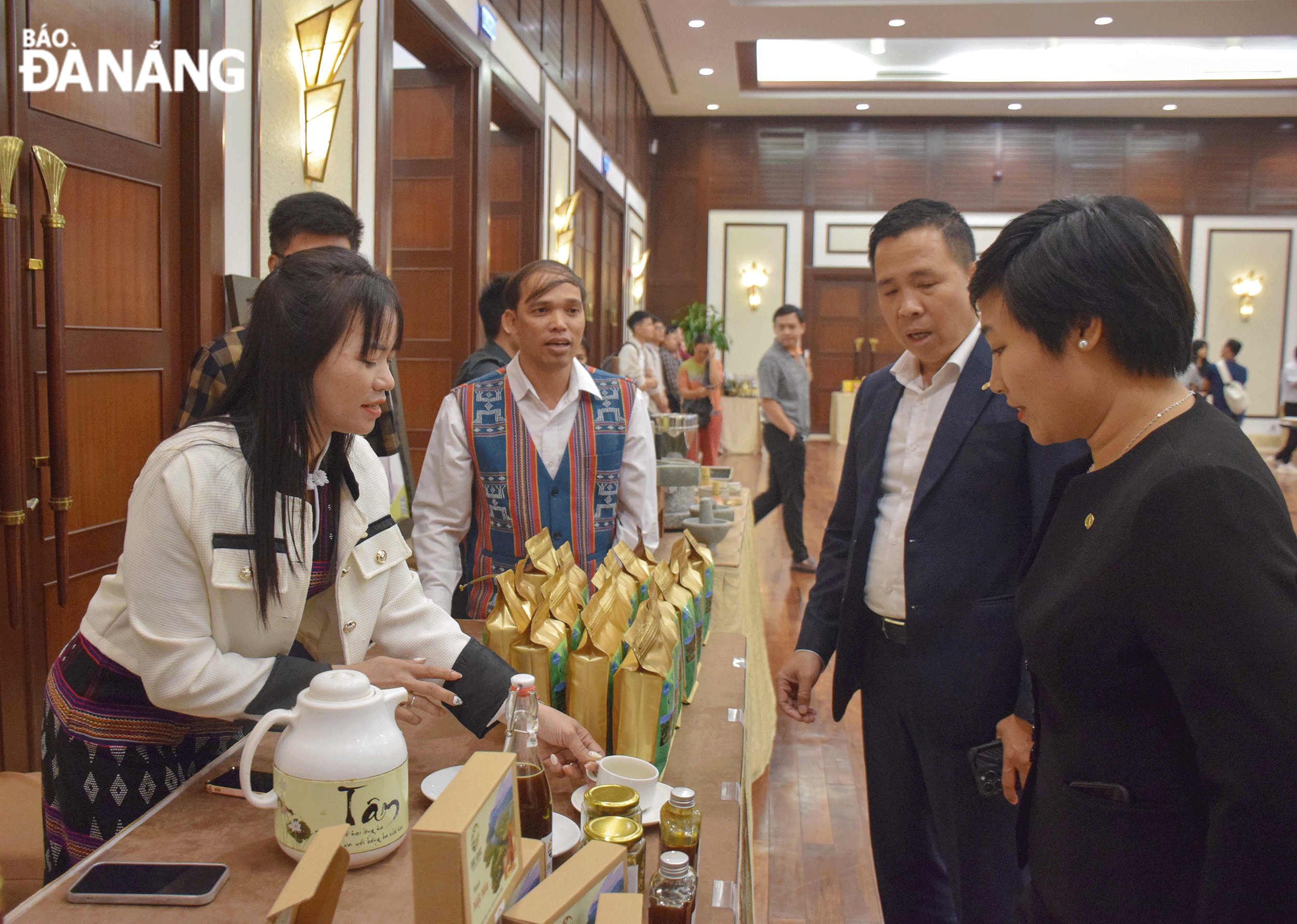Preserving and developing Vietnamese tea culture
Vietnamese tea is not only a drink but also a traditional cultural feature, because it connects the spiritual values, customs and practices of the Vietnamese people. Inspiring the younger generation to understand and love tea helps them know how to enjoy it in a sophisticated way, while at the same time preserving and conserving the Vietnamese tea culture.
 |
| Tea products are displayed and introduced at the talk show ‘Vietnamese Tea Culture’. Photo: DOAN HAO LUONG |
Forming new types of tea
In our country, tea has long been present in daily life and important ceremonies, especially indispensable in meetings with friends and festivals. Vietnamese tea is known for its diversity in types and flavours, but all reflect the sophistication and richness of Vietnamese culture. Nowadays, tea is not only a drink for the previous generation but is also loved and used by young people. Along with traditional teas, many new types of tea have appeared to meet the needs of modern life such as milk tea, and nutritious tea.
Ms. Le Thi Ngoc Anh, the owner of Bach Hoi Hoa Vang medicinal herbs establishment, Hoa Phong Commune, Hoa Vang District said that her establishment currently has teas made from wild bitter melon and wild lingzhi mushrooms. These are products that are still pristine and have not been processed, so they still retain high nutritional content and are good for health.
“To better serve tea drinkers, we operate the Bach Hoi health tea shop. Customers can choose which product they like to drink according to their individual tea orders. We still maintain the traditional tea-making culture by using natural materials such as earthenware and porcelain, so we can preserve the aroma of the tea. Bach Hoi tea helps cool the liver, clears body heat, and is good for people with anemia and insomnia. By producing these types of tea, we want to convey to everyone the choice of tea that is suitable for their health when returning to nature with the medicinal herbs available around them.”, Ms. Anh said.
Meanwhile, Mr. Le Anh Tu, the owner of the Hoa Bac Tea Cooperative, is interested in the tea tree, a typical plant in the Hoa Vang mountainous region. Mr. Tu has been planting tea trees for five years and has now expanded the area to more than 1 hectare.
Mr. Tu said: “We boldly implemented this pilot model and then learned more from the experience of people in Dong Giang and Tay Giang districts, Quang Nam Province to introduce better - than -before products to consumers. Tea tree water is a precious medicinal herb that helps detoxify the liver, sleep well and support treatment for patients infected with HP bacteria.
Currently, Da Nang people have known about tea trees and use them more. We have also exported to the Lao and Japanese markets. In the coming time, we will invest in machinery to produce Vine tea extract and promote it more widely to offices for use as a daily drink”.
In addition to tea and precious medicinal herbs from forests and home gardens, some businesses also take advantage of ginseng flower ingredients to create nutritious drinks and contribute to solving employment for the locality.
Coming to the Da Nang market, Ms. Ho Nhat Phuong, the Director of SBC Hoang Gia Company Limited, said that the raw material is ginseng flower from ginseng trees grown in A Luoi , Thua Thien - Hue Province.
Ginseng flower tea is harvested when the tree is 3.5 - 6.5 months old, so it has high nutritional value and is very good for health. Currently, ginseng flower tea has been trusted and consumed by resorts and hotels and purchased as gifts for guests.
Creating a playground to connect businesses
To create a connection between tea producers and tea lovers, and at the same time raise people's awareness in preserving and developing Vietnamese tea culture, the Da Nang Culinary Culture Association has coordinated with the Viet Nam Culinary Culture Association and the Furama Hotel to organise a talk show ‘Vietnamese Tea Culture’ with the theme ‘Opening the door to Vietnamese tea’ on December 1.
Mr. Ly Dinh Quan, the Chairman of the Da Nang Culinary Culture Association, said that this programme is meaningful in promoting the preservation of Vietnamese tea culture and forming a new cultural feature.
“Tea drinking culture both promotes the preservation of tea culture and contributes to economic development. The greatest significance at present is to preserve and open the door to knowledge about tea for tea lovers and tea producers and traders. Also, it helps create a playground for individuals and tea production organizations to promote resources and creativity in business. This has promoted the formation of new economic sectors and new cultural values. In particular, recently, there has been the appearance of tea vine produced in Hoa Bac Commune, Hoa Vang District. The Association is responsible for connecting and uniting tea vine producers, promoting tea vine to everyone," Mr. Quan explained.
Although it was held for the first time in Da Nang, the ‘Vietnamese Tea Culture’ talk show attracted the participation of 7 businesses inside and outside Da Nang. In addition, many tea lovers came to watch the performance of traditional tea making art by leading Vietnamese tea artisans and enjoy speciality teas from all over the country. This shows that tea is not only a product of nature but also the result of the art of processing and enjoying that has been passed down through many generations.
The sophistication in the art of tea tasting also reflects the cultural values, traditions and customs of each locality. Understanding tea will help the younger generation appreciate, preserve and develop Vietnamese tea culture on the basis of traditional tea culture.
Reporting by DOAN HAO LUONG - Translating by A.THU